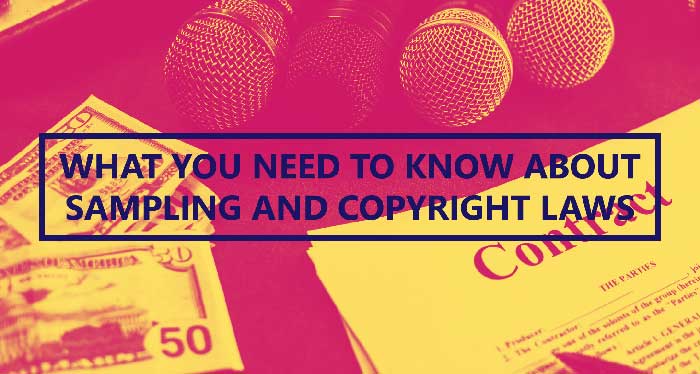Audio Realm Studios What You Need to Know About Sampling and Copyright Laws

Sampling has become a very common practice across all music genres. Sampling is the use of portions of prior recordings that will be used in new compositions. Unfortunately, it is also common for a number of people to attempt to sample music and songs without permission. Sampling without permission violates two distinct copyrights laws: the sound recording copyright (normally owned by the record company) and the copyright in the song (usually owned by the publishing company or songwriter). Here is how to go about sampling the right way to ensure you don’t face legal troubles down the road.
Obtain Permission
To legally sample a previous recording you’ll first need to obtain permission from the copyright owner. This will typically be the publishing company or record label. To legally obtain permission you’ll have to gain approval from both the copyright owner and owner of the sound recording. Once you have gained permission to sample the music or song, the next step is to pay the fee for a license to use the sampled material. These fees depend on the quantity of the sample that you intend to use. This can be something simple like a mere second or a whole verse or chorus of a song. Another deciding factor in the price of your sample is its intended use. It’s far more expensive to build an entire song around the sampled content versus a small portion of a single verse or for seconds within the chorus.
Paying Your License Rights
After you have obtained permission to sample and have confirmed your ability to afford the fee, now it’s time to purchase your license. There are two ways to do this: pay a flat fee for the usage or pay a percentage of the mechanical royalty rate. If you opt to go the flat fee route, a buyout fee on average is between $1000 – 2000. The ladder option of paying mechanical royalty rates in the amount a person pays to the owner of the copyright to make a copy of “mechanical reproduction” of the song itself. The percentage of the mechanical royalty rates are generally somewhere between 1 and 3 cents per record. Keep in mind that everything can be negotiated right down to free licensing, so don’t be afraid to ask for what you want. It’s also important to note that there are firms that can also negotiate clearances for samples. These firms typically charge a lower rate than an entertainment attorney, although hiring an attorney is also another option.
Penalties for Copyright Infringement
If obtaining a license seems like a hassle, then you should be aware of the repercussions of copyright infringement. The penalties for copyright infringement can be anywhere from a few hundred dollars to as much as $20,000. If the court finds that you had prior knowledge of the infringement and willingly violated copyright, the damages can soar to as high as $100,000. The owner of the copyright can also issue an injunction that forces you to stop using the music or song for which the sample was used. Even worse you might be forced to recall all of your albums or uploads. If you’re going to sample music, or even find that your sounds are very similar to another song already in circulation, be sure to follow the steps outlined here to ensure that you are not devastated by hefty fines and fees for copyright infringement. Also, be sure that should your music or song be sampled, you have rights and should exercise them to ensure that you are well compensated for your sound.
Find Out More
You may be wondering what exactly it will cost you to record your song or full-length album. The exact costs will depend on a variety of factors, including quality (demo or commercial release), how many instruments are involved, and whether you’re well-rehearsed. To find out more about our hourly rates and get an estimate for your project, feel free to contact our team! today.
